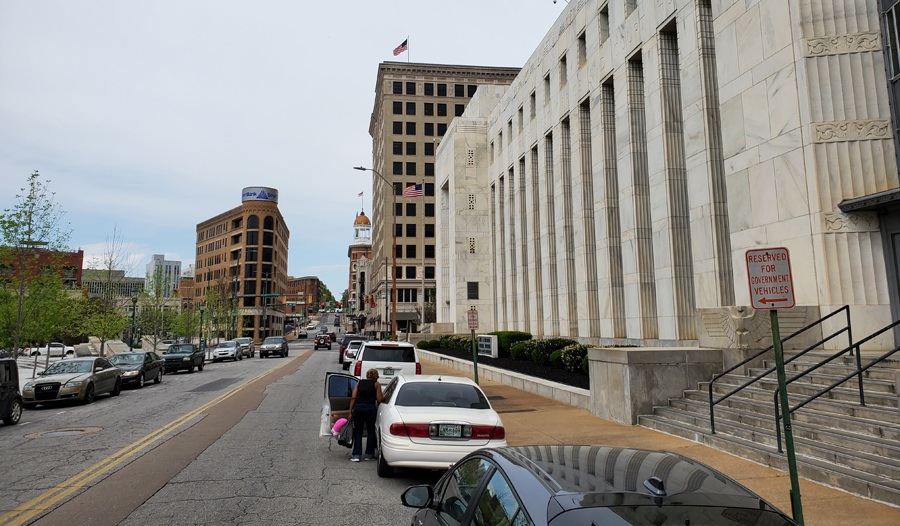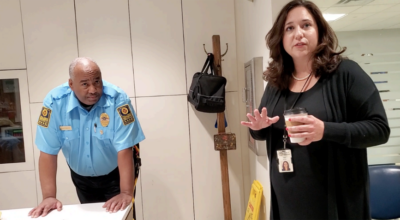
The Crandall case says you have an absolute right to travel to this building in Chattanooga. So, if stopped by a city cop and you don’t have a driver license or a tag, you can say, “I’m going to the post office downtown by right, sir.” (Photo David Tulis)

John Chambers, police chief of Chattanooga. His department has ignored administrative notice 2,402 days, with no consequence
CHATTANOOGA, Tenn., Wednesday, Sept. 18, 2024 — Chattanooga city council has approved John Chambers as the chief of police, a man Mayor Tim Kelly calls an “experienced leader.” The 20-year department veteran “has spent decades earning the trust and respect of our community and everyone at CPD. He is the right person at the right time to continue CPD’s progress while maintaining their high law enforcement standards.
Meanwhile I am developing stronger defenses for the rights of travel that city of Chattanooga has oppressed by policy for the last 2,402 days, since the time Feb. 20, 20218, that I put it under Tennessee transportation administrative notice, a public document outlining the disabilities of state transportation law and the liberties of Tennesseans. It includes research in a pending case in Hamilton County that builds upon the notice and seeks judicial review of two most pernicious abuses of the people, who have an absolute right to go to the post office or the federal courts building downtown.
An absolute right, one Mayor Kelly and his predecessor, Andy Berke, and his predecessor, have abrogated and denied.
“I am truly humbled and excited to enter this new role,” Mr Chambers says. “It is an absolute honor to serve. *** I am committed to working alongside members of our community and our officers to ensure we address concerns in every part of our great city. We are a purpose driven, people focused, mission oriented department with a record of utilizing the most progressive and innovative law enforcement strategies to combat the many aspects of crime in our community. This is who we are, and I am proud to serve you in this way.”
The post office defense
Well, such talk is just noise because cops pointedly disregard black-letter law, and refuse to be reformed — until you file suit.
Tennessee transportation administrative notice, a mere 20pp, lays out in detail the many court cases protective of our right to move about without police violence an harassment. My claims against two men who kidnapped me from the public street Nov. 22, 2023, brings up these rights, and intends to assert I have a personal right of ingress and egress, especially since I was going to work at my radio station, running as it does on a federal license.
I had right that day to go to my press job, constitutionally protected in its own right, just as I had right to travel to the Joel Solomon federal courts and post office building downtown. Here’s proof from a great case, Crandall v. State of Nevada, 73 U.S. 35. 44. 45 (1867)
The people of these United States constitute one nation. They have a government in which all of them are deeply interested. This government has necessarily a capital established by law, where its principal operations are conducted. Here sits its legislature, composed of senators and representatives, from the states and from the people of the states. Here resides the President, directing through thousands of agents the execution of the laws over all this vast country. Here is the seat of the supreme judicial power of the nation, to which all its citizens have a right to resort to claim justice at its hands. Here are the great executive departments, administering the offices of the mails, of the public lands, of the collection and distribution of the public revenues, and of our foreign relations. These are all established and conducted under the admitted powers of the federal government.
That government has a right to call to this point any or all of its citizens to aid in its service, as members of the Congress, of the courts, of the executive departments, and to fill all its other offices, and this right cannot be made to depend upon the pleasure of a state over whose territory they must pass to reach the point where these services must be rendered. The government also has its offices of secondary importance in all other parts of the country. On the seacoasts and on the rivers it has its ports of entry. In the interior it has its land offices, its revenue offices, and its subtreasuries. In all these it demands the services of its citizens and is entitled to bring them to those points from all quarters of the nation, and no power can exist in a state to obstruct this right that would not enable it to defeat the purposes for which the government was established.
The federal power has a right to declare and prosecute wars, and, as a necessary incident, to raise and transport troops through and over the territory of any state of the Union.
If this right is dependent in any sense, however limited, upon the pleasure of a state, the government itself may be overthrown by an obstruction to its exercise. Much the largest part of the transportation of troops during the late rebellion was by railroads, and largely through states whose people were hostile to the Union. If the tax levied by Nevada on railroad passengers had been the law of Tennessee, enlarged to meet the wishes of her people, the Treasury of the United States could not have paid the tax necessary to enable its armies to pass through her territory.
But if the government has these rights on her own account, the citizen also has correlative rights. He has the right to come to the seat of government to assert any claim he may have upon that government or to transact any business he may have with it. To seek its protection, to share its offices, to engage in administering its functions. He has a right to free access to its seaports, through which all the operations of foreign trade and commerce are conducted, to the subtreasuries, the land offices, the revenue offices, and the courts of justice in the several states, and this right is in its nature independent of the will of any state over whose soil he must pass in the exercise of it.
The views here advanced are neither novel nor unsupported by authority. The question of the taxing power of the states, as its exercise has affected the functions of the federal government, has been repeatedly considered by this Court, and the right of the states in this mode to impede or embarrass the constitutional operations of that government, or the rights which its citizens hold under it, has been uniformly denied.
Crandall at 44. 45 (emphasis added)
Your defense in your traffic case, your lawsuit under 42 U.S.C. § 1984 for civil rights violation, is enhanced by my administrative notice. It denies local police actors, municipal governments and deputies the defense of “I didn’t know” and “I didn’t intend” to violate your ingress-egress rights, your free access to the post office or the courts. You’ve heard about my powerful public document remedy since 2018. It’s time you quit sitting on your hands, time to stop just being entertained by our work, and take up these tools for self-liberation. Just click the link.

